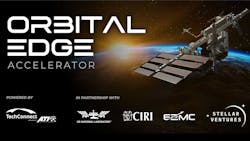ISS National Lab names six startups for inaugural Orbital Edge Accelerator program
Summary points:
-
The ISS National Lab selected six startups from across the U.S. to join the inaugural Orbital Edge Accelerator, providing up to $500,000 in funding, mentorship, and opportunities for ISS-sponsored research.
-
Participating companies develop technologies ranging from in-space logistics and AI-driven satellite controls to radiation shielding, neurological research platforms, laser cooling, and autonomous edge computing.
-
The accelerator program, supported by corporate partners like AWS, BAE Systems, and J.P. Morgan, aims to foster innovation in low Earth orbit and accelerate commercial space economy growth.
KENNEDY SPACE CENTER, Fla. - The International Space Station (ISS) National Laboratory has selected six early-stage companies to participate in the first Orbital Edge Accelerator program, a new initiative aimed at advancing space-based research and technology development in partnership with private investors.
Chosen from a competitive pool of applicants, the selected startups are Kall Morris, Inc., of Seattle; Magma Space, of Boulder, Colo.; Melagen Labs, of Austin, Texas; Olfera, of Boston; Quantum Qool, of Santa Barbara, Calif.; and Raptor Dynamix, of Washington, D.C. Each company will receive up to $500,000 in non-dilutive funding, mentorship, and the opportunity to launch research investigations sponsored by the ISS National Lab.
"Accessing space allows entrepreneurs to push the boundaries of science and technology, develop products, and build new businesses," said Sven Eenmaa, ISS National Lab chief economist. "With the Orbital Edge Accelerator, the ISS National Lab builds on its strategic priority to engage the startup community and fuel the next wave of innovators that will shape the future space economy."
Commercial space station company Starlab Space opens European subsidiary
The accelerator, delivered in partnership with commercialization group TechConnect, runs for seven months and is backed by Cook Inlet Region, Inc. (CIRI), E2MC, and Stellar Ventures. Additional support comes from corporate partners, including Amazon Web Services, BAE Systems, Boston Consulting Group, Greenberg Traurig, and J.P. Morgan, which provided expertise during the selection process and will mentor the inaugural cohort.
Tech projects
The program is designed to bridge the gap between innovative startups and the unique capabilities of low Earth orbit. Participating companies represent a range of technologies:
- Kall Morris, Inc., is developing in-space logistics and space debris removal systems, building on prior ISS-based testing of its hardware and software.
- Magma Space is creating AI-powered satellite control systems using magnetic actuation to improve stability, agility, and autonomous maneuverability.
- Melagen Labs is advancing lightweight, high-efficiency radiation shielding for satellites, spacesuits, and habitats.
- Olfera is exploring the brain’s olfactory pathway using lab-on-a-chip devices to develop new treatments for Alzheimer’s disease and other neurological disorders.
- Quantum Qool uses ultrafast lasers to create nanostructures that boost cooling performance for space and semiconductor systems.
- Raptor Dynamix is building smart, autonomous edge-computing systems to improve decision-making and responsiveness in dynamic environments.
The Orbital Edge Accelerator is part of a broader effort by the ISS National Lab to support commercial innovation in space. According to the organization, nearly 100 startups have previously conducted research on the ISS, collectively raising more than $2.4 billion in post-flight investment.
About the Author
Jamie Whitney
Senior Editor
Jamie Whitney joined the staff of Military & Aerospace Electronics in 2018 and oversees editorial content and produces news and features for Military & Aerospace Electronics, attends industry events, produces Webcasts, and oversees print production of Military & Aerospace Electronics.
